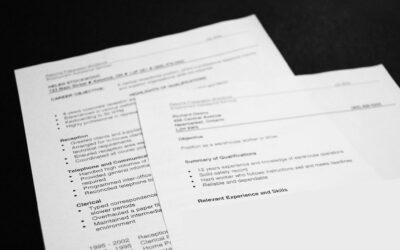Email has become an essential form of communication in today’s job search, but how you handle it can make a positive first impression or make your next employer question your judgment. Here’s what you need to know about job search email etiquette including what to include in your job search emails, how to format your email, and how to make sure your email message is read.
First, I recommend that you have a separate email for just your job search activities. This is especially true if you use a shared computer, that is, other family members use the same computer for homework, financial records, etc. This insures that other family members don’t accidentally delete, or mark as read, your important job search related mail. Also as you go through this process you will begin to collect alerts, updates, newsletters, notices and other communications from the job search sites you visit. When you have concluded your search you can just stop checking this address and your personal mail is not clogged forever with stuff you no longer need.
Email accounts are everywhere on the internet and are normally free. Some of the more popular are; Gmail, yahoo mail, hotmail and there are many more. The process to sign up is quick and easy so there is no reason not to use those that are available.
2. Now that you are creating a new address make sure it is professional sounding. Many times we create a personal email address that is significant or descriptive of who we are, such as, gooseboy@gmail.com (a goose hunter) or cowboyfan@ gmail.com (Oklahoma State alum) or hotchick@ gmail.com (well, I won’t go into it). It is best to use a combination of your first name, or initial, and last name separated by a dot or underscore. The impression you want to make is that you are a professional – you want them to remember your name not your hobby.
3. Check this email regularly and return messages promptly. Most recruiters use email as a preferred method of contact and judge your interest in their job by the time it takes you to respond. Even if your reply is that you need more time to do what is requested, all email must on be answered within 24 hours.
4. Create a signature block, it should contain your full name, phone number, tag line from your LinkedIn profile, a link to your LinkedIn profile, and your QR code (don’t know what a QR code is, look at my previous post “Using QR Codes in Your Job Search”). It is frustrating for a recruiter to get an email and desire to contact you, then have to search for your resume to find your phone number. Frankly, most won’t take the time. Make it easy for someone to contact you. Usually it is not necessary to use your street address in your signature block.
5. Make the subject line work for you, it should be descriptive of the purpose of the message. Remember that the people you will be emailing will be receiving many (perhaps hundreds) of emails daily, when they are rushed for time they will scan the subject lines and pay attention to those that seem most important.
6. Spelling, grammar and punctuation rules apply. Poor spelling and grammar can make you appear to be careless and unorganized, neither is how you want to appear as a job seeker. Take the time to us spell-check on your massage and carefully re-read your message to be sure it reads as you intended (by the way, spell-check didn’t catch the misspelling earlier in this sentence). Don’t be judged by something so easy to fix.
7. And finally, smiley faces don’t belong on your job search communications; this is no time to be cute.
Bonus Tip: If you are still employed, don’t use your work email to send job search correspondence! This is a very good way to become unemployed (most employers monitor email traffic, so they’ll see that resume go out)! And, it doesn’t show a new employer that you are very loyal or respectful of your current employer. Doesn’t make you a very appealing applicant.
While email is a more informal form of communication, you still need to take it seriously and observe all the rules of business communication. It’s important that all your communications are as professional as they would be if you writing an old-fashioned paper letter. A great message can be sabotaged by the wrong address, less than courteous language, or other slang that might be acceptable with friends and family but inappropriate in a business setting.

Rick Christensen: Director, Career Transition Practice Rick has been a career consultant for over 25 years, serving a very broad-based and diverse clientele. His specialties include effective group facilitation, one-on-one coaching and consultation at all levels including senior executives.
Rick’s passion is coaching individuals through career transitions, developing career management strategies and in identifying and sharpening competencies to open doors to new opportunities. His efforts have assisted thousands of individuals achieve their full potential.
Contact Rick at: Rick@CareerDevelopmentPartners.com



